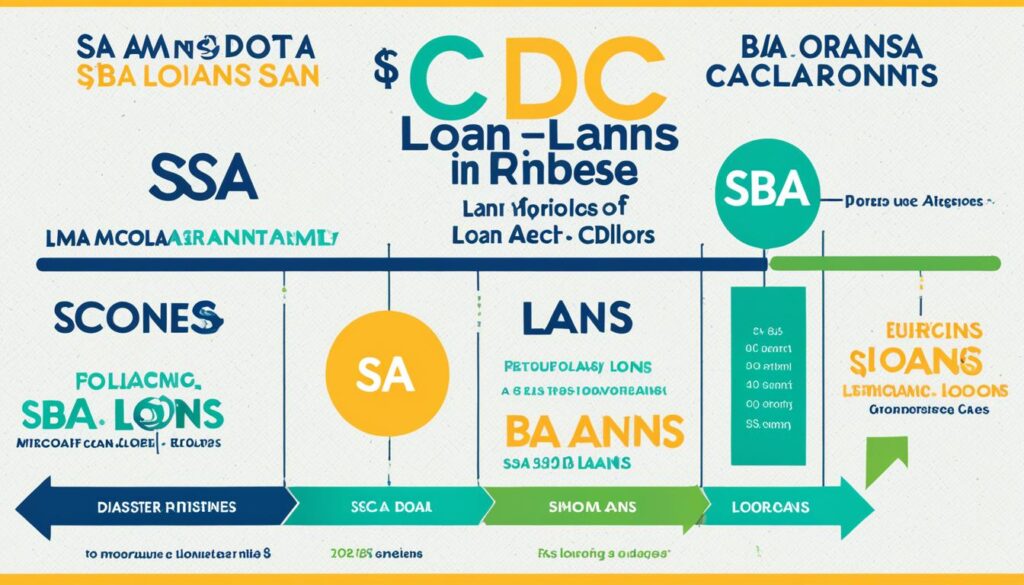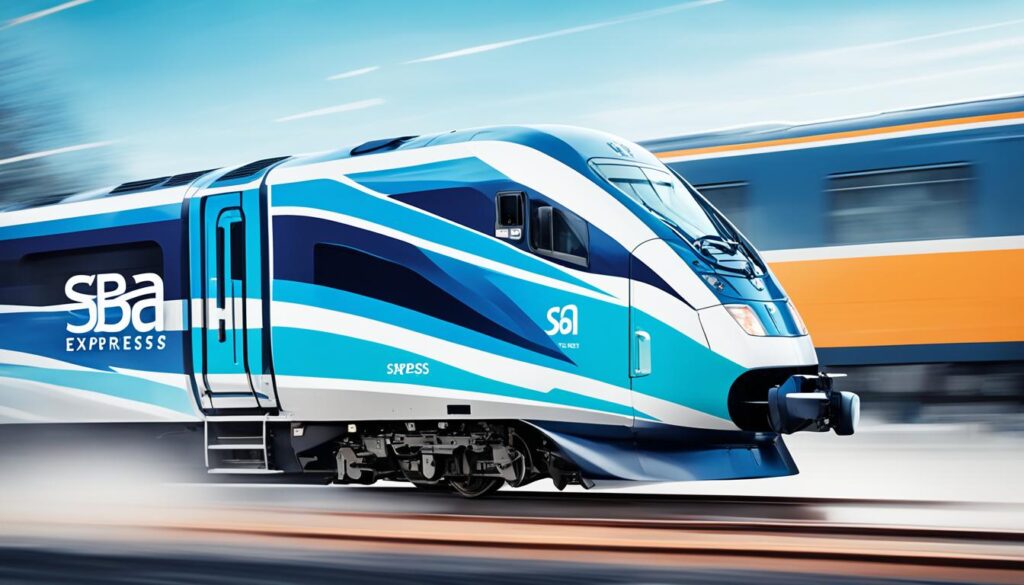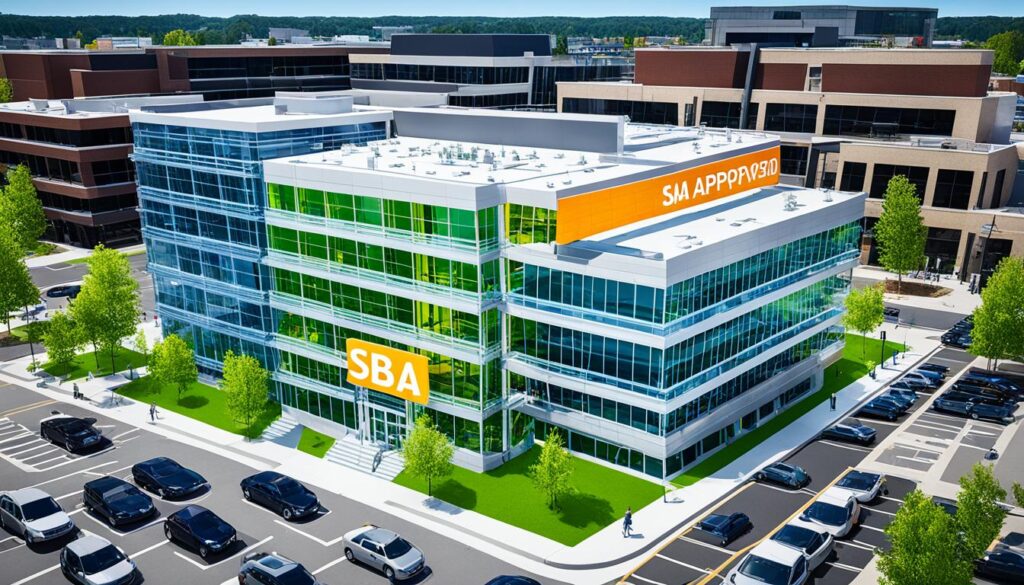SBA loans are a popular option for small businesses looking for financing. These loans, partially guaranteed by the U.S. Small Business Administration, offer flexible terms and low interest rates, making them an attractive choice for entrepreneurs.
Small businesses can use SBA loans for a variety of purposes, including startup costs, working capital needs, expansions, real estate purchases, and more. With different types of SBA loans available, business owners have a range of options to choose from depending on their specific needs.
In this article, we will explore the various SBA loan options that small businesses can consider. Understanding these loan types can help entrepreneurs make informed decisions and secure the necessary funding to fuel their growth and success.
Key Takeaways:
- Different types of SBA loans provide options for small businesses seeking financing.
- SBA loans offer flexible terms and low interest rates, making them an attractive choice for entrepreneurs.
- SBA loans can be used for various purposes, such as startup costs, working capital needs, expansions, and real estate purchases.
- Some of the different types of SBA loans include SBA 7(a) loans, SBA Express loans, SBA 504 loans, SBA microloans, SBA disaster loans, and SBA export loans.
- Each type of SBA loan has its own eligibility criteria and requirements, so it’s important to understand the specifics before applying.
SBA 7(a) Loans
SBA 7(a) loans are one of the most common types of SBA loans. These loans offer small businesses the opportunity to secure funding for a variety of purposes, including working capital, equipment purchases, and business expansions. With the potential to provide up to $5 million in financing, SBA 7(a) loans are an attractive option for entrepreneurs looking to grow their companies.
One of the key advantages of SBA 7(a) loans is their competitive interest rates. Small businesses can benefit from lower borrowing costs, allowing them to allocate more resources towards their growth strategies. Additionally, these loans typically come with longer repayment terms, providing borrowers with manageable monthly payments.
When it comes to working capital, SBA 7(a) loans can provide the necessary funds to support day-to-day operations, cover payroll expenses, and finance inventory purchases. This type of financing is particularly advantageous for businesses experiencing seasonal fluctuations or those looking to seize growth opportunities.
Furthermore, SBA 7(a) loans can also be used to finance equipment purchases. Whether it’s upgrading existing machinery or acquiring new tools to expand production capacity, these loans offer the financial flexibility needed to invest in the necessary equipment to support business operations.
With SBA 7(a) loans, small businesses can access the capital they need to fuel their growth and achieve their goals. From working capital to equipment purchases, these loans provide entrepreneurs with the financial support to navigate the challenges of running and expanding a small business.
To illustrate the potential impact of SBA 7(a) loans on small businesses, refer to the following table:
| Loan Amount | Loan Purpose | Interest Rate | Repayment Term |
|---|---|---|---|
| $100,000 | Working capital | 5% | 10 years |
| $500,000 | Equipment purchases | 4% | 20 years |
| $1,000,000 | Business expansion | 4.5% | 25 years |
As seen in the table, SBA 7(a) loans offer competitive interest rates and flexible repayment terms, allowing small businesses to access the necessary capital while minimizing the financial burden.
Overall, SBA 7(a) loans are a versatile financing option for small businesses seeking working capital or funding for equipment purchases. Their attractive terms and favorable conditions make them a popular choice among entrepreneurs looking to fuel their growth and achieve long-term success.
SBA Express Loans
SBA Express loans provide small businesses with fast funding options, making them ideal for entrepreneurs who need quick access to capital. With the potential to secure up to $500,000, these loans are well-suited for various business needs, including working capital, real estate purchases, and equipment acquisitions.
What sets SBA Express loans apart from other SBA loan programs is their simplified application process and faster approval times. This expedited process enables businesses to receive the necessary funds promptly, helping them seize time-sensitive opportunities or address urgent financial obligations.
Small business owners can leverage SBA Express loans for real estate purchases, allowing them to expand their operations or acquire a suitable space for their business needs. Whether it’s a retail store, office space, or warehouse, SBA Express loans empower entrepreneurs to invest in their own real estate and build equity over time.
Moreover, SBA Express loans are often used for equipment purchases, enabling businesses to upgrade their machinery or invest in new technology. By staying up-to-date with modern equipment, small businesses can increase their productivity and efficiency, gaining a competitive edge in their industry.
Benefits of SBA Express Loans:
- Fast funding for small businesses
- Flexible use of funds for working capital, real estate, and equipment
- Simplified application process
- Faster approval times compared to other SBA loan programs
When it comes to securing funding for your small business, SBA Express loans provide the speed and flexibility required to seize opportunities and drive growth. With the simplified application process and fast approval times, entrepreneurs can access the capital they need without long delays or extensive paperwork.
Take advantage of the SBA Express loan program for your real estate purchases or equipment upgrades, and position your business for success.
| Loan Feature | SBA Express Loans |
|---|---|
| Loan Amount | Up to $500,000 |
| Use of Funds | Working capital, real estate purchases, equipment purchases |
| Application Process | Simplified |
| Approval Times | Faster than other SBA loan programs |
SBA 504 Loans
SBA 504 loans are a specialized form of financing designed specifically for businesses in need of long-term funding for fixed assets such as land, machinery, and facilities.
With SBA 504 loans, businesses can secure funding up to $5 million, making it an ideal option for those with substantial investments in real estate or equipment.
One of the key advantages of SBA 504 loans is their longer repayment terms, which can extend over 10 to 25 years. This provides businesses with the opportunity to spread out the repayment of their loan, allowing for better financial management and reduced strain on cash flow.
By offering longer-term financing, SBA 504 loans can help businesses achieve stability and sustainability while securing the necessary fixed assets to support growth and expansion.
To give you a clearer understanding of how SBA 504 loans compare to other SBA loan options, here is a breakdown:
| SBA Loan Program | Loan Amount | Repayment Terms |
|---|---|---|
| SBA 7(a) loans | Up to $5 million | Up to 25 years |
| SBA Express loans | Up to $500,000 | Up to 25 years |
| SBA 504 loans | Up to $5 million (or up to $5.5 million for select projects) | 10 to 25 years |
This table clearly demonstrates that SBA 504 loans offer competitive loan amounts and repayment terms that align with the unique needs of businesses seeking to invest in long-term, fixed assets.
Other Types of SBA Loans
In addition to SBA 7(a) loans and SBA 504 loans, the Small Business Administration (SBA) offers a range of other loan options to support small businesses. These loans provide tailored financing solutions for various business needs, including working capital, disaster recovery, and international trade. Here are some other types of SBA loans:
SBA Microloans
SBA microloans are ideal for small businesses that need access to smaller loan amounts, up to $50,000. These loans can be used for working capital, purchasing inventory, supplies, equipment, and machinery. Microloans are typically offered by nonprofit community-based lenders and come with flexible repayment terms to accommodate the specific needs of small businesses.
SBA Disaster Loans
When a business faces physical damage or economic losses due to a declared disaster, SBA disaster loans provide crucial financial assistance. These loans help businesses repair or replace damaged property and cover operating expenses that cannot be met due to the disaster. SBA disaster loans offer low-interest rates and are available to businesses of all sizes and nonprofits that have been affected by a disaster.
SBA Export Loans
For businesses engaged in international trade, SBA export loans can provide the necessary working capital or financing to support export sales. These loans help businesses expand into global markets and cover expenses related to exporting goods and services. With favorable terms, SBA export loans offer competitive interest rates and flexible options tailored to the specific needs of businesses involved in international trade.
| Loan Type | Loan Amount | Usage | Eligibility |
|---|---|---|---|
| SBA Microloans | Up to $50,000 | Working capital, inventory, supplies, equipment, machinery | No specific credit score requirement; requirements determined by individual lenders |
| SBA Disaster Loans | Varies based on need | Repair physical damage, cover operating expenses due to a declared disaster | Businesses affected by a declared disaster |
| SBA Export Loans | Varies based on need | Working capital, financing for export sales | Businesses involved in international trade |
These additional types of SBA loans provide small businesses with more options to secure the funding they need for growth and resilience. Whether it’s accessing working capital, recovering from a disaster, or expanding into international markets, the SBA remains committed to supporting small businesses throughout their journey.
Conclusion
SBA loans provide small businesses with a valuable funding solution. With competitive rates, longer terms, and larger loan amounts compared to other financing options, SBA loans can help businesses meet their funding needs and fuel growth. However, it’s important to note that qualifying for an SBA loan can be challenging.
Lenders have strict eligibility criteria that businesses must meet in order to be considered for an SBA loan. These criteria often include factors such as credit history, business financials, collateral, and industry type. Small businesses should carefully evaluate their financial situation and assess their ability to meet the SBA loan requirements before applying.
By thoroughly understanding their funding needs and the specific requirements of SBA loans, business owners can increase their chances of securing financing. It’s advisable to consult with a financial advisor or SBA-approved lender who can guide them through the loan application process and help them navigate the complexities of SBA loan requirements.
Overall, SBA loans are a powerful tool for small business funding, but they require careful planning, preparation, and diligence. Businesses that approach SBA loans with a clear understanding of their financial situation and the loan requirements are more likely to secure the funding they need to thrive and succeed.








